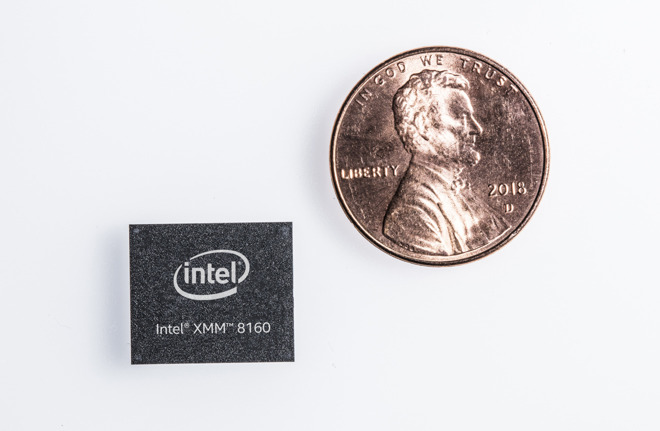Apple developing own iPhone cellular modem, hirings and insiders say
A new Apple job listing is suggesting that the company is looking to break the shackles of Qualcomm and Intel for the iPhone in the future, raising the possibility again that Apple might make its own cellular modem.

Intel's iPhone modem with penny for scale
In a job listing posted in early December, Apple is seeking a cellular systems architect to work out of San Diego. Why specifically in San Diego isn't clear -- other than effectively being Qualcomm's backyard -- but sources told The Information that Apple has plans to build a new cellular modem chip out of that location.
While the job listing is new, Apple's intentions to develop its own cellular modem have been fairly clear based on recent hires. In 2014, Apple recruited at least 30 mid and senior-level RF engineers from Broadcom and Qualcomm, suggesting an intent to begin working on its own internal baseband chips.
Executives cited for the project are Bernd Adler, previously of Intel's modem team and Esin Terzioglu, a former vice president at Qualcomm and presently Apple's wireless chip head.
The report from The Information suggests that any Apple-designed chip is three years away from shipping.

Intel's iPhone modem with penny for scale
In a job listing posted in early December, Apple is seeking a cellular systems architect to work out of San Diego. Why specifically in San Diego isn't clear -- other than effectively being Qualcomm's backyard -- but sources told The Information that Apple has plans to build a new cellular modem chip out of that location.
While the job listing is new, Apple's intentions to develop its own cellular modem have been fairly clear based on recent hires. In 2014, Apple recruited at least 30 mid and senior-level RF engineers from Broadcom and Qualcomm, suggesting an intent to begin working on its own internal baseband chips.
Executives cited for the project are Bernd Adler, previously of Intel's modem team and Esin Terzioglu, a former vice president at Qualcomm and presently Apple's wireless chip head.
The report from The Information suggests that any Apple-designed chip is three years away from shipping.

Comments
The patent licensing fees don’t really change if they make there own. Just not a lot of advantages. If Apple is able to set licensing fees based on component costs however, watch out! A custom modem than would be low single digit dollars instead of high tens of dollars. That’s big. LTE modems cost about $130 for iPads and tablets. That could drop to basically free if the licensing structure changes.
There isn’t much reason for LTE not to be in virtually all computing devices. They should be in all laptop computers, all tablets, all cars, all GPS devices, etc. The current licensing structure effectively stops this from happening as it is too expensive.
Apple needs to do their own not just to escape Qualcomm because of the legal disputes but because Qualcomm is doing quite badly. They had a net income loss in 2018 of $4.86 billion. In 2014, they had net income of $7.54 billion and it's been trending down since.
Market cap is still about $71 billion which is ridiculous for a company that's losing money big time. If they were still making decent profits, I'd argue Apple should buy them.
I further doubt we'd see a significant, if any price drop in retail pricing. At best, Apple might go to their previous pricing model— more features and/or performance for the same price. And I wouldn't expect that to last.
Apple is big enough to negotiate favorable terms with QCOM and got a rebate, while QCOM maintained its licensing structure. But if Apple wants to by from another party like Intel or MediaTek or build their own, the licensing structure makes doing it expensive. There’s a reason why Samsung decided on shipping QCOM SoCs and modems in the USA instead of their own, all these years now.
Apple won’t discount LTE products by $130 or $100, primarily because it prices products based on price tiers and add hardware that represents that cost. If the licensing was cheaper, it may mean more RAM, more storage, bigger charging bricks in the box, better other hardware item, etc. That’s where the win is.
Another big win is that cellular modems could be just part of the marginal cost of computing chipset, like WiFi is. Are there good reasons why cellular support isn’t part of a laptop chip sets from Intel? Other than licensing costs?